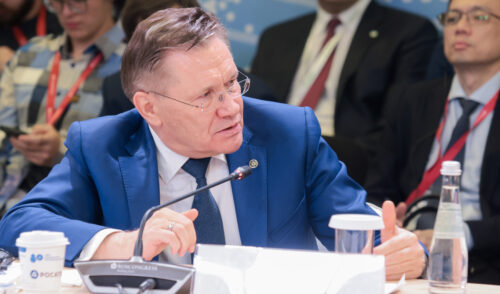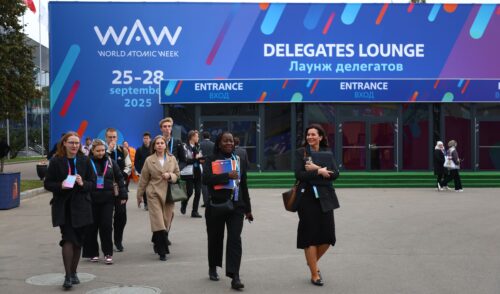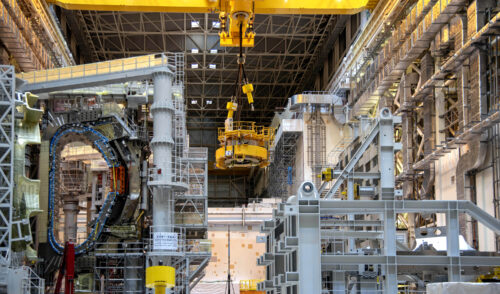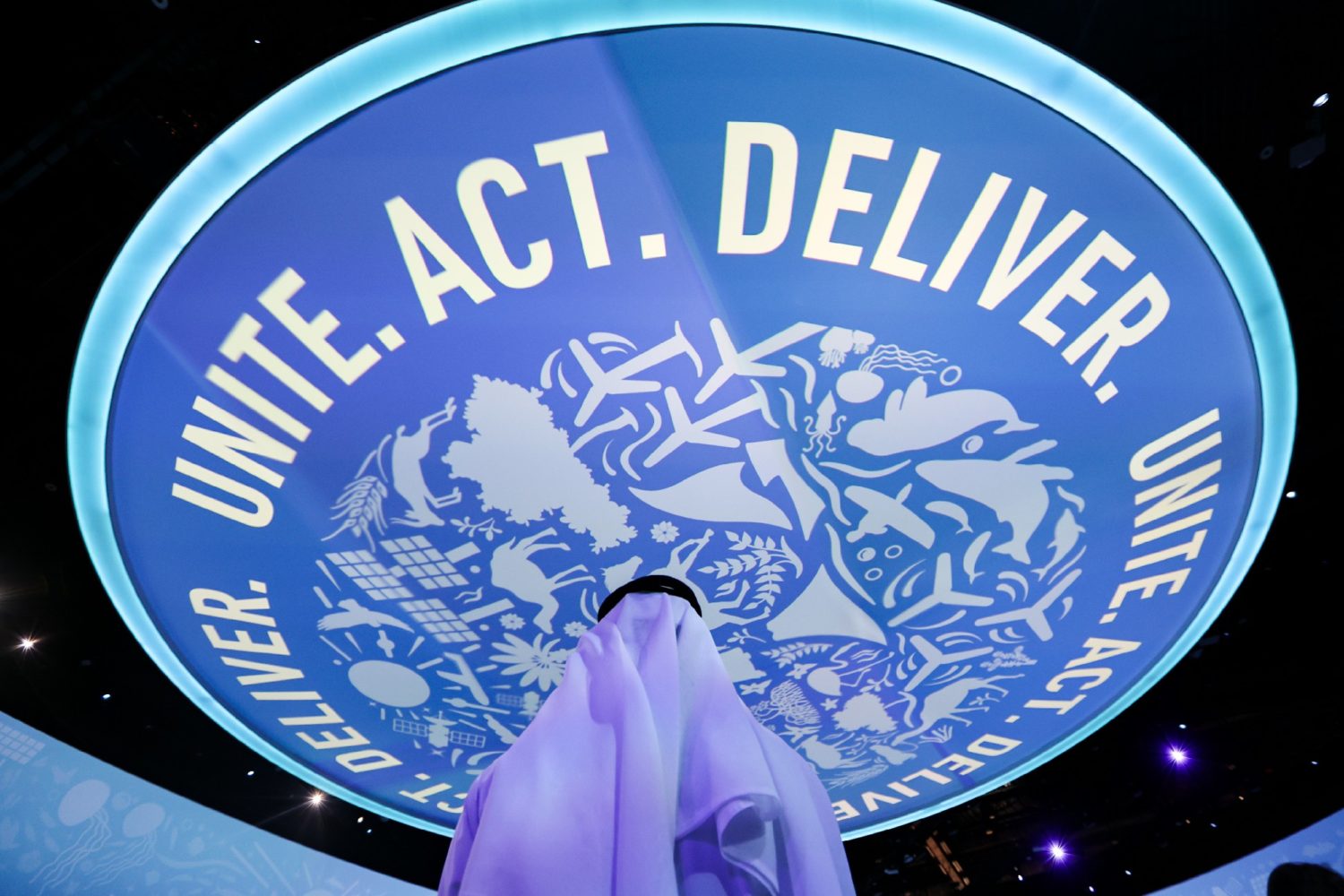
Atoms Grow in Appeal
back to contentsThe UN Climate Change Conferences have been held for 28 years, but nuclear fell under the spotlight of the parties only as little as two years ago. Nuclear technology is now seen as instrumental in achieving carbon neutrality and energy security. At COP28, Rosatom joined a nuclear capacity tripling initiative, presented its latest small-scale nuclear generation solutions, and signed several agreements.
To be tripled
Rosatom joined the Net Zero Nuclear Industry Pledge calling for the tripling of the world’s nuclear capacity by 2050. The document was signed by 123 companies and organizations operating in 140 countries. “We recognize the urgent need to address climate change, and nuclear power is a proven, fast and sustainable solution to decarbonization challenges. By joining the nuclear companies’ pledge, we reaffirm our commitment to working with national governments and stakeholders to triple nuclear capacity by 2050,” said Kirill Komarov, First Deputy Director General for Corporate Development and International Business at Rosatom (for more on the nuclear funding initiatives read Nuclear Needs Finance in this issue).
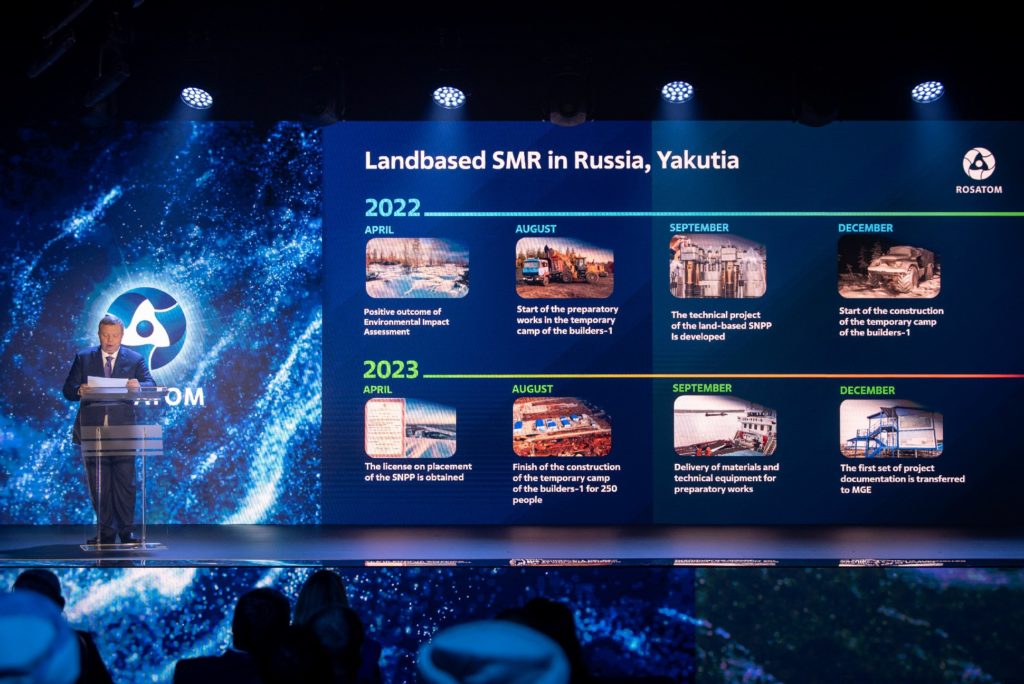
Great interest in small reactors
Rosatom organized an SMR day at COP28 to present small-scale nuclear generation solutions. Although there are more than 70 different designs of small modular reactors (SMRs) in the world, Rosatom is the only company that produces commercial SMRs and offers its international customers time-proven small-scale generation solutions that can be customized in terms of power and equipment for any application or geographic location.
“We are convinced that nuclear energy will underlie the low-carbon energy mix, for which all of us strive. And small-scale nuclear generation will take a rightful place in the nuclear power industry of the future as a reliable technology. I am confident that Rosatom’s small-scale nuclear capacity solutions will become an effective and environmentally safe choice for those countries that, for a number of reasons, have never considered nuclear generation before,” Rosatom Director General Alexey Likhachev said in a video message to the SMR Day visitors.
Having watched a colorful multimedia presentation about Yakutia, the guests learned about the nature of this Arctic region and the culture of its people. This is where Rosatom intends to build Russia’s first onshore small-scale nuclear station with the latest RITM 200N reactor. The station, which will give a boost to the local development, is being built with care for the fragile northern ecosystems. According to the plans, it will produce its first electricity in 2028.
It is noteworthy that, while COP28 was in progress, Rosatom began to manufacture stainless steel structures with a total weight of over 165 tonnes for the Yakutian small-scale nuclear power plant. “We are already making a reality what others are still planning,” AtomEnergoMash CEO Igor Kotov stressed.
Rosatom also presented other small-scale nuclear generation projects. The world’s only floating nuclear power plant Akademik Lomonosov has been supplying power to the Chukotka city of Pevek for four years, having generated over 700 million kWh of electricity. A virtual tour of the plant was organized for the SMR Day guests.
Another major project is the construction of new floating SNPPs with RITM 200M reactors for Baimsky GOK, a large mining and processing facility in Chukotka. They are planned to be put in operation in 2029.
One more small-scale nuclear power plant, this time with a SHELF-M microreactor, will be built to supply power to the Sovinoye gold deposit. It is expected to feed its first electricity to the grid in 2030.
Over 160 guests from 30 countries attended the SMR Day event, which is an indication of strong international interest in Russian small-scale nuclear generation solutions. Among the panel session speakers were Director General of the World Nuclear Association Sama Bilbao-y-Leon, and representatives of relevant ministries and energy companies from different countries. The panelists discussed how small-scale nuclear generation could help regions and industries overcome many of development constraints.
Tight business schedule
Rosatom representatives took part in other sessions held in the Russia Pavilion. The Energy Day organized by the Russian Ministry of Energy was held there on December 6. On December 8, Rosatom organized the Atom Day for Future Generations. Top managers of the Russian nuclear corporation, Russian and foreign experts shared their views on the role of nuclear technology in ensuring energy transition across countries. On December 10, Rosatom representatives participated in the Day of Science-Based Approach to Climate Policy organized with support from the Russian Ministry of Economic Development. On the same day, Yuri Olenin, Deputy Director General for Science and Strategy at Rosatom, spoke at the panel session on the role of science in tackling climate change. Employees of the Russian nuclear corporation also spoke at the discussions organized by Egypt and Turkey, and at the panel sessions on youth and gender issues.
New agreements
Rosatom and DP World signed a global strategic cooperation agreement on the sidelines of COP28. That was the second agreement concluded by the nuclear corporation with the Dubai-based leading provider of transportation and logistics services. According to the agreements, the parties intend to set up an international logistics operator to improve commodity exchange and create seamless transportation and logistics chains in the Russian and international markets, primarily in the BRICS countries. In delivering the goal, the parties will rely on Russia’s logistics infrastructure, including the Northern Sea Route, and infrastructure of other Eurasian countries, as well as the Middle East, Africa and South America.
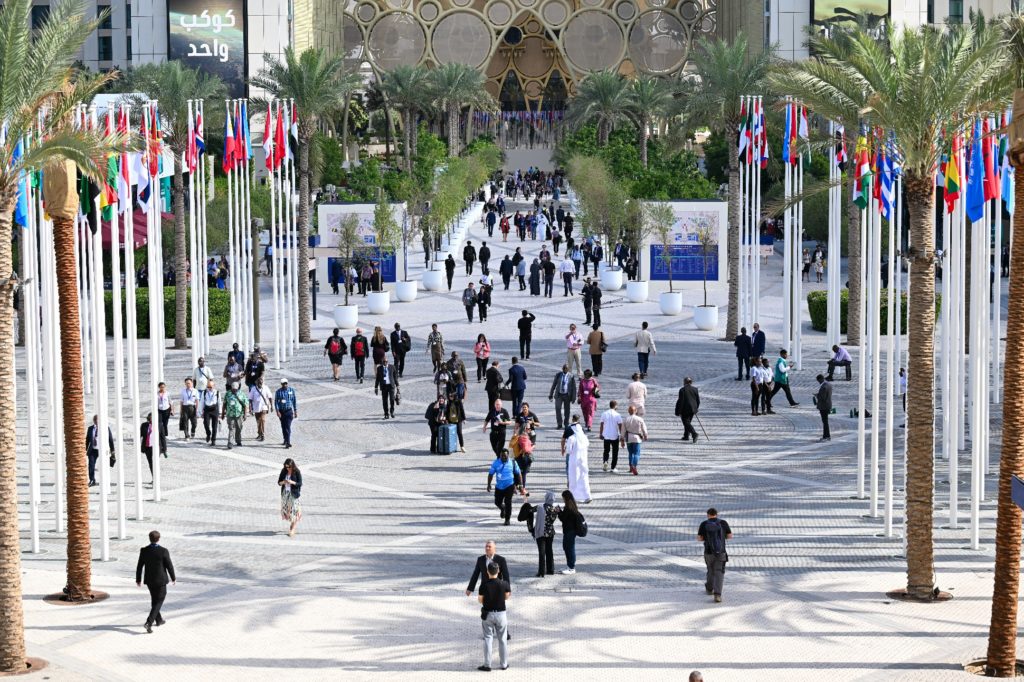
NOVEMBER 30: General view of attendees during the UN Climate Change Conference COP28 at Expo City Dubai on November 30, 2023, in Dubai, United Arab Emirates. (Photo by COP28 / Anthony Fleyhan)
In addition, Rosatom and the South African state-run energy company Eskom signed an agreement to establish strategic partnerships as part of the international Alliance of People-Centered Organizations. The companies will join efforts in implementing HR projects and initiatives and will coordinate activities in developing a human-centered approach to personnel training.


